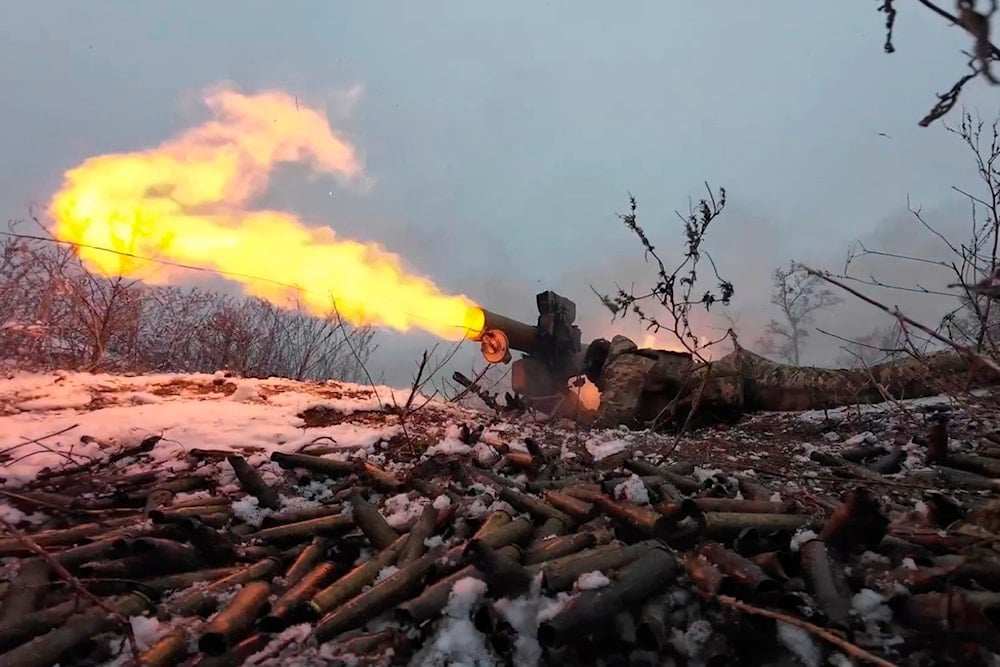Kharkiv hit by intense ballistic missile barrage from Russia: Mayor
The governor of the Kherson region also claimed that one person had been killed and three others injured over the last 24 hours.
-

In this photo taken from a video released by Russian Defense Ministry press service on Monday, Dec. 23, 2024, a Russian serviceman fires a 9M113 Konkurs wire-guided anti-tank missile at an undisclosed location (AP)
A "massive missile attack" struck Kharkiv, a city in northeastern Ukraine, early Wednesday, according to Mayor Igor Terekhov.
"Kharkiv is under a massive missile attack. A series of explosions were heard in the city, and there are still ballistic missiles heading towards the city," Terekhov stated on Telegram.
The regional governor reported seven Russian strikes, noting that the number of casualties was still being determined.
The governor of the Kherson region also claimed that one person had been killed and three others injured over the last 24 hours.
Meanwhile, Russia's Defense Ministry announced that its forces had intercepted 59 Ukrainian drones overnight. The Ukrainian Air Force confirmed Kalibr cruise missiles had been launched from the Black Sea, though their target was initially unclear.
In a related context, Ukraine's Energy Minister, German Galushchenko, stated that Russia was launching extensive attacks on the country's energy sector, though he did not specify the targeted cities.
"The enemy is again massively attacking the energy sector," Galushchenko wrote on Telegram.
He added, "The transmission system operator is taking the necessary measures to limit consumption to minimize the negative consequences for the energy system."
This comes as Russia has intensified its push across eastern Ukraine in recent months, aiming to gain as much ground as possible before US President-elect Donald Trump assumes office in January.
The newly elected US president has vowed to resolve the nearly three-year conflict quickly but has not outlined specific terms for a ceasefire or peace agreement.
Since the war's onset in February 2022, Russia has inflicted significant damage on Ukraine's power grid through repeated bombings, resulting in frequent power outages.
Ukraine has consistently urged its allies to provide stronger air defense systems to counter Russian attacks on the country’s beleaguered energy infrastructure.
Last month, Washington authorized Kiev to deploy long-range American missiles against military targets within Russia, to which the latter responded by launching nearly 200 missiles and drones aimed at Ukraine’s power grid in November.
Moscow's forces said they have captured over 190 Ukrainian settlements this year, while Kiev faces challenges in maintaining its defenses amid manpower and ammunition shortages.
NATO leaders urge defense boost amid concerns over potential US shift
The Independent reported on Tuesday that NATO's leaders in Latvia, Estonia, and Finland have raised concerns about Europe's lack of readiness to defend itself against Russia without substantial US involvement. They called for an urgent increase in defense spending across the alliance to address the growing threat posed by Moscow.
"We are not ready. That's absolutely clear," stated Latvian President Edgars Rinkevics. He warned against relying too heavily on the United States, saying, "We can't keep simply hoping for a situation where the US remains much involved in Europe."
Estonian Prime Minister Kristen Michal echoed these sentiments, stressing the need for Europe to strengthen its military capabilities. "We have to ramp up our defense capabilities because of Russia's threat and its inability to be a democracy and operate in a rule-based world," he said.
The three countries, which collectively share a 1,200-mile border with Russia and its ally Belarus, have been among NATO's top spenders on defense relative to their GDP. Estonia allocates 3.4% of its GDP to defense, Latvia spends 3.15%, and Finland invests 2.4%. In comparison, the UK spends 2.3%, though plans are underway to raise that figure to 2.5%.
Finland, which joined NATO in 2023 alongside Sweden, has significantly enhanced its military strength, including the recent purchase of 64 F-35A fighter jets valued at $9.4 billion. "We don't have this because we're worried about Stockholm or London. We have this because we're worried about Moscow," said Finnish President Alexander Stubb.
The leaders also expressed concerns about the potential impact of Donald Trump's return to the White House, given his skepticism of NATO and calls for European nations to contribute more to defense spending. Trump's comments earlier this year suggesting he would allow Russia to "do whatever the hell they want" to underfund NATO members drew sharp criticism for undermining the alliance's core principle of mutual defense.
Read more: EU depleting gas reserves at fastest pace since onset of energy crisis
Delusional defense
While none of the leaders believe Trump would withdraw the US from NATO entirely, they acknowledge the risk of Washington shifting its strategic focus toward China and the Indo-Pacific region. "Their number one nemesis or competitor is China," said Stubb, though he stressed that US engagement in Europe remains vital.
The discussion also highlighted the importance of supporting Ukraine against Russian aggression. Estonian Prime Minister Michal underscored the broader implications of Ukraine's struggle: "If we allow Russia as a regime, as a thug, as a bully, to take something by force... then that would be a very bad message for the future of the democratic world."
The leaders reaffirmed the urgency of Europe's defense industry scaling up production to meet the demands of the conflict. "We are already at the edge of what we have," admitted Rinkevics.

 5 Min Read
5 Min Read









